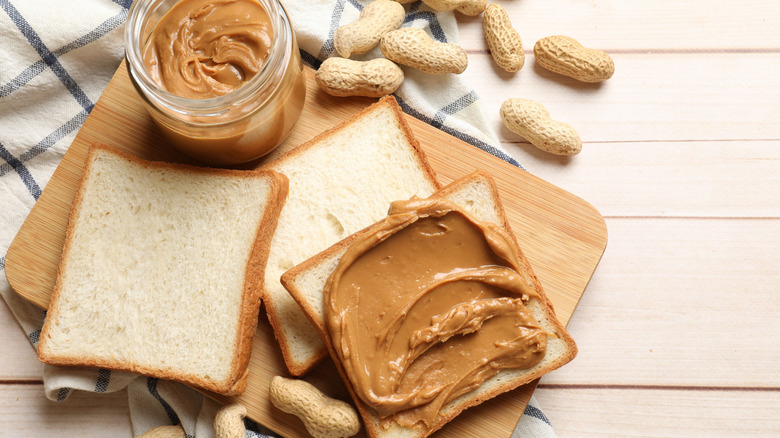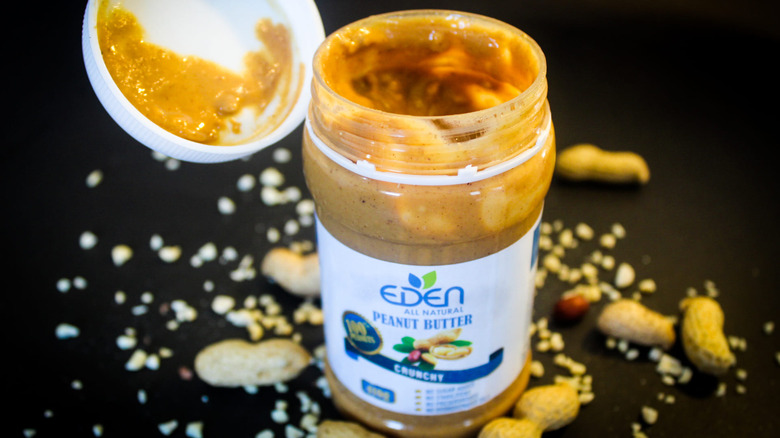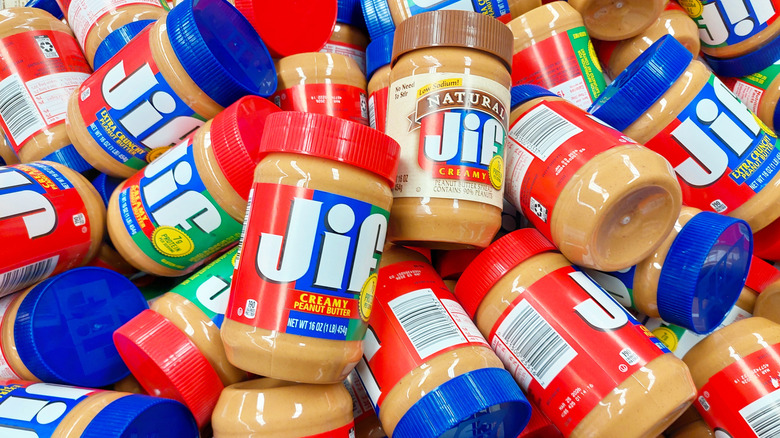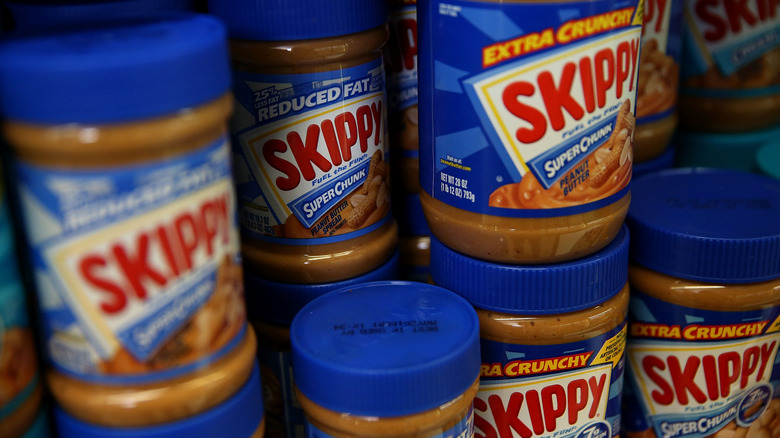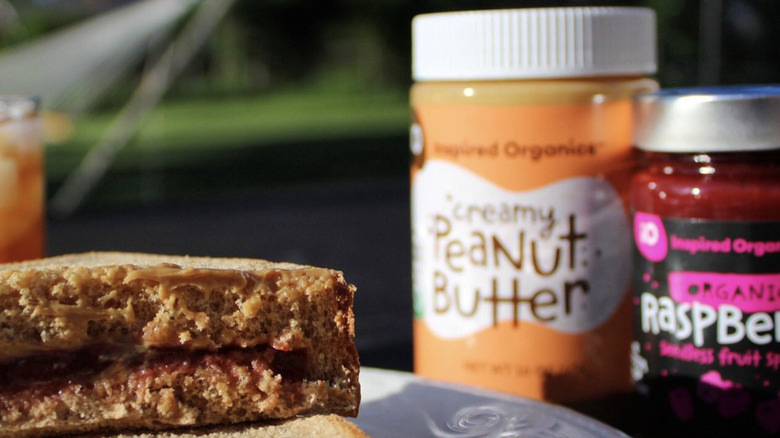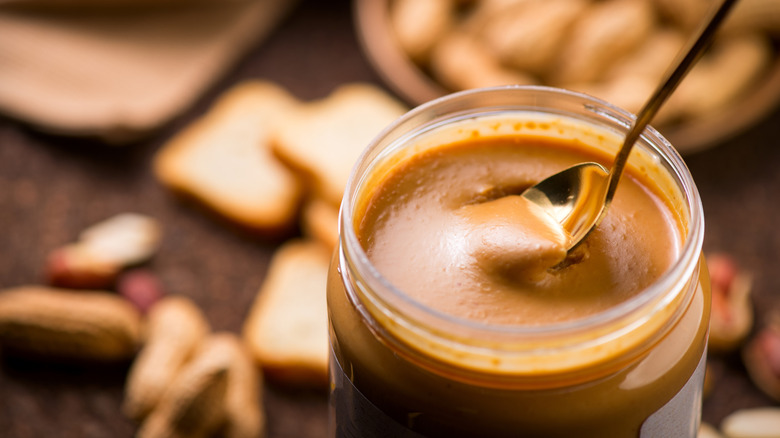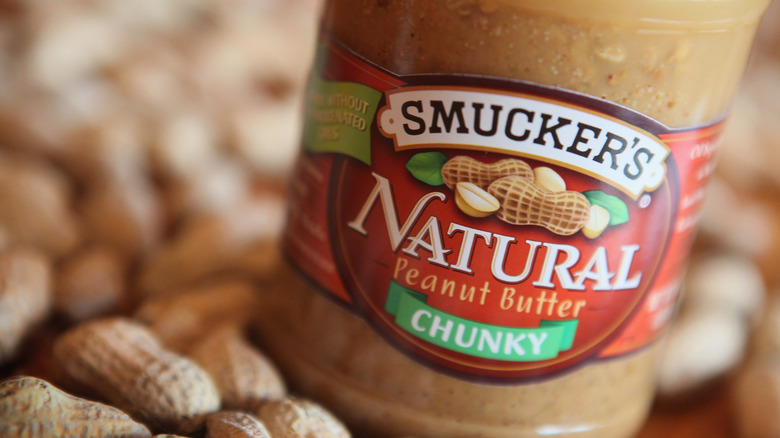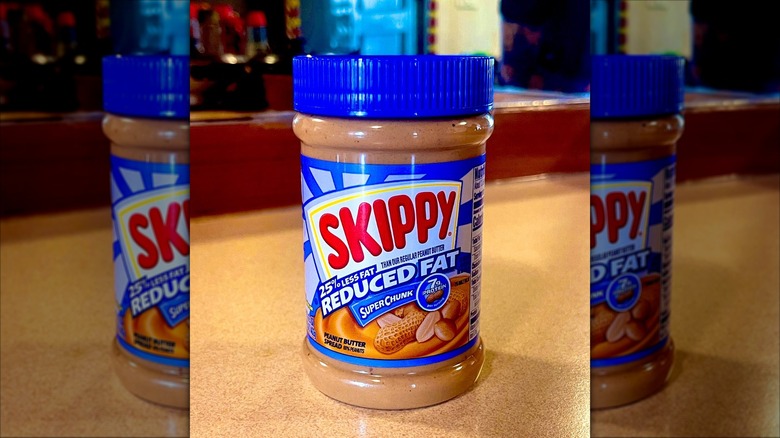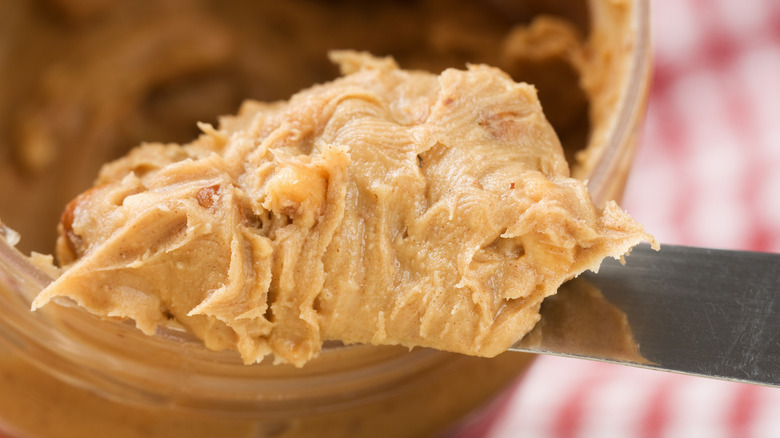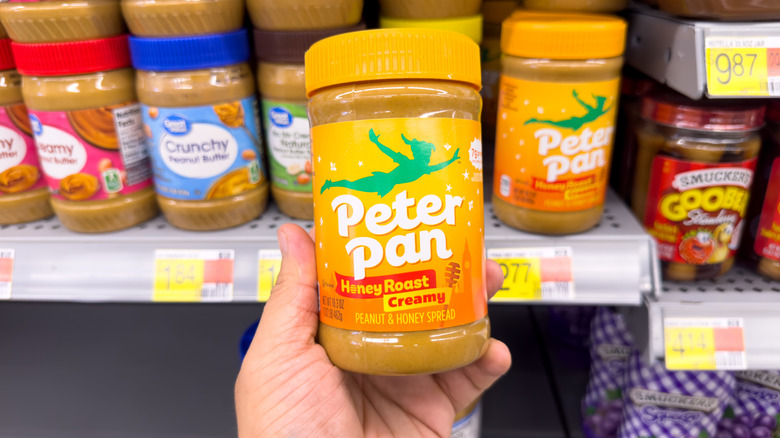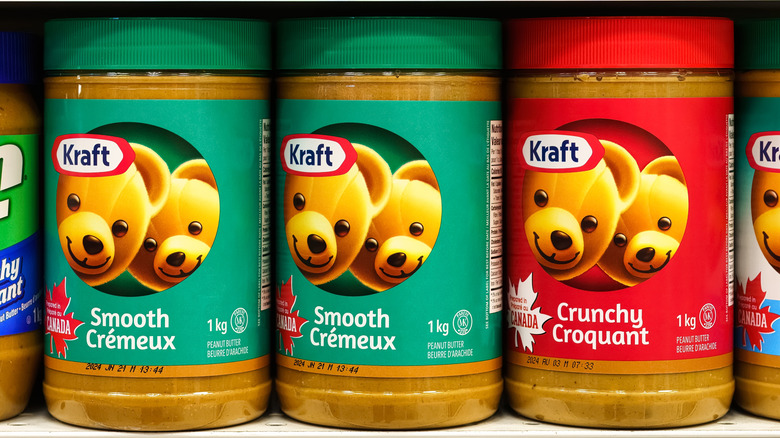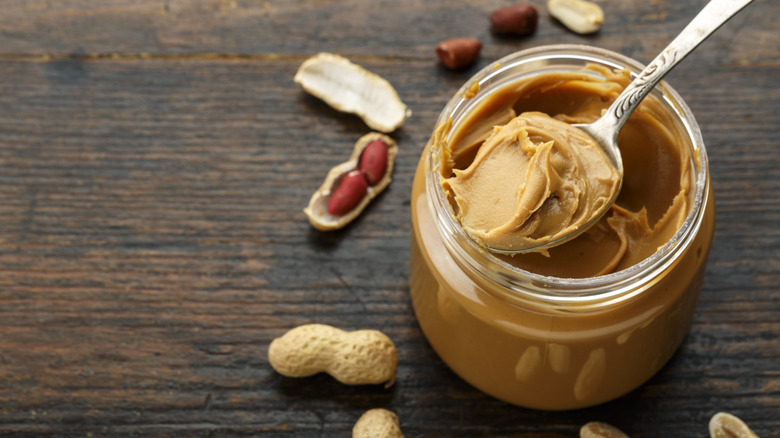Peanut Butter Recalls That Affected Millions
Peanut butter is often considered a pillar of the American culinary experience, and for good reason. Americans eat roughly 3 pounds of peanut butter per person per year. In total, we work our way through about 700 million pounds on an annual basis — which, to put it into perspective, is enough to coat the floor of the Grand Canyon.
With that in mind, a peanut butter recall of any level is kind of a big deal. Jars of this creamy spread lurk in a huge number of kitchens. In fact, it's thought that 94% of people in the U.S. have peanut butter in their pantry at any given time. As a result, any kind of food safety scare that includes peanut butter can have pretty serious widespread consequences, especially considering the prevalence of salmonella in recent decades. While it's most commonly associated with undercooked meat, salmonella has proven particularly stubborn in peanut butter due to the fact that its low moisture, paired with its high sugar and fat content, provide the perfect environment for the bacteria to thrive.
But salmonella isn't the only concern pulling peanut butter off shelves. Over the years, multiple risks and scares have forced brands to recall their products, some of which were more alarming than others. From toxins to metal, here's a look at some of the industry's biggest peanut butter recalls.
House of Natural Butters (2024)
The most recent major recall to hit the peanut butter scene actually occurred not in the U.S. but in South Africa. In February 2024, supermarket chain Pick n Pay pulled its smooth No Name peanut butter from shelves. It also cleared out both the smooth and crunchy varieties of Eden All Natural, as did other grocery stores such as Faithful to Nature and Takealot. Later that month, the National Consumer Commission (NCC) also warned that two more stores — Dis-Chem and Wazoogles — had also recalled peanut butter.
As it turns out, they had a very good reason for doing so. The peanut butter in question was produced by House of Natural Butters, which had found that its peanut butter contained a higher-than-acceptable concentration of aflatoxin. This toxic mold is a known carcinogen that has been linked to a wealth of concerning side effects when consumed in high amounts, such as nausea, vomiting, abdominal pain, and acute liver injury. (Did you really expect anything else from something with "toxic" in its name?)
Unsurprisingly, the NCC went on to launch a full-scale investigation, after which more brands faced urgent recalls. This included multiple Eat Naked peanut products, Woolworth's peanut butter ice cream, and 10,776 units of Clover Go Nuts peanut butter. Luckily, no actual illnesses were reported, but better safe than sorry.
Jif (2022)
Jif has been an American institution since 1956, boasting the largest market share in peanut butter by a landslide. It would be unrealistic to think that the brand's gone over 60 years without some kind of blip on its record. Sure enough, its most recent recall scandal occurred in 2022, when Jif peanut butter was linked to a salmonella outbreak that sickened 21 people and hospitalized four across 17 states.
The outbreak started in May when the first five people affected all claimed that they had recently eaten peanut butter. Four of these same five people specifically recalled eating Jif peanut butter. Thanks to a handy testing tool called Whole Genome Sequencing, the Food and Drug Association (FDA) was then able to trace the outbreak back to a J.M. Smucker (which bought Jif in 2001) facility in Lexington, Kentucky.
As a result, the plant closed for weeks, with a spokesperson telling Axios that it was "confident in the aggressive steps that were taken to address the events." While J.M. Smucker claimed that it had "identified a breach" in its machinery that allowed rainwater to seep through the systems and onto its roasted peanuts — creating the perfect bacterial breeding ground in the process — it was later revealed that the plant had a recurrent history of salmonella dating all the way back to 2017. Overall, it's thought that the whole scandal cost J.M. Smucker around $125 million.
Skippy (2022)
Before Jif snatched its crown, Skippy was America's best-selling peanut butter for over 30 years. It may no longer technically be number one, but it came out on top of our peanut butter ranking and it's still popular enough for a mass recall to be an issue. That was the case back in 2022 when a huge amount of Skippy peanut butter disappeared from supermarket shelves after the company revealed that some jars may be contaminated with tiny shards of stainless steel.
The recall affected a total of 9,353 cases of both the creamy and chunky varieties of Skippy Reduced Fat Peanut Butter Spread, plus Skippy Creamy Peanut Butter Blended With Plant Protein — a number that becomes even more shocking when you realize that this equals 161,692 pounds of peanut butter altogether. The good news is that Skippy never actually received any reports from customers finding a sprinkle of steel in their peanut butter. However, considering the damage a mouthful of metal could potentially cause, the brand had no choice but to carry out the costly recall after its internal detection systems alerted it to the fact that manufacturing equipment may have potentially affected a small number of jars. The whole debacle would be easier to forget if it was Skippy's first major recall — but, as we'll get to later, that's not quite the case.
Inspired Organics (2018 - 2019)
Salmonella isn't the only bacteria known to plague peanut butter. Despite its optimistic name, Inspired Organics found itself at the center of a food safety scandal in late 2018 when its nut and seed butters — peanut butter included — tested positive for Listeria monocytogenes.
Like salmonella, listeria can cause a fever, nausea, stomach pain, and diarrhea. However, it has also been linked to more serious, even fatal infections among the vulnerable, and can trigger miscarriages and stillbirths. This kind of bacteria should theoretically be killed by the heat of the roasting process, but the reality is that peanut butter can still be contaminated if production facilities don't take the right precautions.
While the recall started with sunflower butter, the brand's distributor, Lipari Foods LLC, ultimately recalled almond, peanut, and tahini butter from 15 states and Ontario, Canada. With all of these products heralding from the same plant owned by the Oskri Organics Corporation in Lake Mills, Wisconsin, this recall went on to cover all nut butter that emerged from the facility. Fortunately, no illnesses were linked to any of the nut butter involved, but the Lake Mills plant didn't fare quite as well. Four months after the first recall notice, it officially closed its doors for good.
Sunland Inc. (2012)
In September 2012, a salmonella outbreak that sickened 29 people and hospitalized four led to the recall of Trader Joe's Valencia Creamy Salted Peanut Butter. But it didn't stop there. Over the course of a few weeks, what was initially suspected to be a limited outbreak ended up blowing up to the point that all nut products produced by Sunland, Inc. between March and September 2010 — including those sold at Target, Sprouts Farmers Market, and Heinen's — were pulled from circulation.
An intense FDA investigation soon followed, which concluded that Sunland, Inc. had found salmonella in 11 batches of its products in just three years yet circulated said products anyway. By November, over 40 people were reported as sick across 20 states, a significant percentage of which were children under the age of 10. It was then that Sunland's New Mexico plant had the unfortunate distinction of being the first shut down by the FDA under the Food Safety Modernization Act of 2011. This also required it to stop distributing food until its facilities took corrective measures.
These corrective measures never manifested, as Sunland didn't manage to bounce back from this blow. Less than a year later, the company filed for Chapter 7 bankruptcy protection. In 2014, the U.S. Bankruptcy Court auctioned off the facility responsible for the outbreak, officially closing the curtain on a tough chapter for the peanut butter industry.
Smucker's (2011)
While Smucker's is the parent company to some of the biggest names in the biz — including Jif, Adams, and Laura Scudder's — it was its own self-named line of peanut butters that sparked a recall in 2011. To be specific, it was Smucker's Natural Chunky Peanut Butter. Routine sampling found that it was contaminated with salmonella bacterium, which meant that the brand needed to pull all 16-ounce jars sold between November 8 and November 17, 2011.
This was no small feat, considering that by that point, about 3,000 jars had already been shipped to 24 states while another 16,000 sat untouched in Smucker's warehouses. Thanks to the company's quick response, no illnesses were linked to the consumption of Smucker's Natural Chunky Peanut Butter. That makes this one of the less alarming salmonella outbreaks tied to peanut butter over the years, but also proves just how critical routine testing is to food safety.
Skippy (2011)
Years before Skippy was forced to recall its peanut butter over metal shards, a round of routine testing identified salmonella in a batch of products from its Little Rock, Arkansas, factory. Once again, it was the Skippy Reduced Fat Peanut Butter Spread (both creamy and chunky) that was affected, with a whopping 64,020 units recalled by Unilever United States Inc., Skippy's then-parent company.
No illnesses had been reported at the time of the recall. As Skippy moved so quickly, no illnesses were reported after the recall, either. Customers who found Skippy Reduced Fat Peanut Butter Spread at home were encouraged to toss the jar ASAP and contact the company to secure their coupon for a replacement. This all occurred in March 2011, when people seemed more concerned about the lack of nutritional value in reduced fat peanut butter than potential salmonella. As per Grist, "the real scandal" was Skippy stripping out peanut butter's monounsaturated fats — which have proven health benefits — and replacing them with a bunch of additives and hydrogenated oil. Personally, we'd rather take the additives and oil than a potential dose of salmonella, but that's just us.
Peanut Corporation of America (2008 - 2009)
The Peanut Corporation of America (PCA) scandal of 2008 isn't just one of the worst peanut butter recalls in history but one of the biggest food recalls of all time. What started with a string of salmonella cases across 12 states in November soon escalated and took two months to trace to its source: PCA's manufacturing plant in Blakely, Georgia.
By this point, the outbreak had spread way beyond those initial 12 states. A total of nine people died and over 700 people fell ill in 46 states, with one case reported in Canada. It's thought that the actual numbers are much higher; as per the Centers for Disease Control and Prevention (CDC), for every confirmed case of salmonellosis, roughly 30 cases were unreported. That brings the estimated real total to around 22,000 cases.
While the outbreak slowed in early 2009, the damage was already done. Over 3,000 peanut products were recalled in total, with the FDA finding that PCA — which filed for Chapter 7 bankruptcy in February 2009 — had a track record for cutting corners for the sake of profit and knowingly shipping out products that had tested positive for salmonella. PCA was ultimately ordered to pay $12 million to victims, while its owner, Stewart Parnell, was sentenced to 28 years in prison, making him the first-ever company executive convicted of a federal felony in a food safety case. His brother Michael Parnell, who served as a food broker for PCA, also received a 20-year sentence.
Peter Pan and Great Value (2006 - 2007)
The noughties weren't a great time for peanut butter. In 2007, ConAgra Foods (which is now known as Conagra Brands) recalled all the peanut butter it had sold since 2004 after one of its plants in Georgia was linked to a mass salmonella outbreak.
As you can imagine, three years' worth of products equaled a fair few jars of peanut butter. At the time, ConAgra Foods produced peanut butter products for both Peter Pan (America's first branded peanut butter) and Walmart's own brand, Great Value. While both obviously still sell peanut butter to this day, it still had a huge impact on sales, with Peter Pan completely vanishing from grocery stores for about six months.
Even unopened, refrigerated peanut butter won't last three years, so the vast majority of products from this timeframe were likely long gone by this point. Regardless, the outbreak still affected at least 625 people across 47 states. Years later, ConAgra Foods pled guilty to shipping adulterated food. While it insisted that it didn't knowingly greenlight shipments of peanut butter contaminated with salmonella, it did admit that its products had tested positive in its Georgia factory at least twice in 2004. As a result, ConAgra Foods was ordered to pay a penalty of $11.2 million — pocket change compared to the $275 million it went on to spend on upgrading its facilities and implementing a new testing process to prevent similar situations in the future.
Kraft (1996)
It's hard to imagine now, but back in the 1990s, the peanut butter industry had yet to experience its first salmonella outbreak — or, at least, its first known salmonella outbreak. That all changed in 1996 when roughly 500 cases of salmonella were tied back to products sold by Kraft Australia. The brand recalled 10 different varieties of peanut butter in what was later described by the Australian Financial Review as the worst crisis in the entire company's history.
At the height of the outbreak, it's said that over 100,000 customers called Kraft Australia to complain. The company lost an estimated $15 million and was subjected to a class action lawsuit with over 500 plaintiffs. One 72-year-old man's death was also traced back to the outbreak after salmonella pathogens were found in his lungs during an autopsy.
It was later decided that the most probable cause of the outbreak came down to Kraft Australia's peanut supplier, The Peanut Co. of Australia Ltd. The company had reportedly decided to move large amounts of peanuts around with an auger that had been stored in a yard plagued by mice, whose droppings most likely contaminated the tool. While the auger was apparently washed before being used, it wasn't sanitized, and so it went on to contaminate the peanuts, too.
Peanut Corporation of America (1990)
Nearly 20 years before the salmonella outbreak that closed the company down for good, the Peanut Corporation of America undertook a slightly less serious recall. This time around, it was forced to withdraw some of its peanut butter after federal regulators discovered high levels of carcinogenic aflatoxins at its Gorman, Texas plant.
After Peanut Corporation of America recalled the affected products, it was sued by two of its corporate customers. The company had sent recall notices a full month after it first learned about the toxic mold, in which time the American Candy Company had already bought hundreds of 50-pound cases of peanut butter and turned them into peanut butter kisses for Walmart. A year later, Zachary Confections of Frankfort, Ind. discovered that its 40,020-pound shipment of peanuts was also extremely high in aflatoxin — luckily before any of its products actually hit the market.
While the Peanut Corporation of America insisted that the peanuts sold to Zachary Confections of Frankfort, Indiana were good, Stewart Parnell — who would one day go on to become the Peanut Corporation of America's president and be imprisoned for its deceptive operations in the late 2000s — reportedly settled both cases. His father, Hugh Parnell, ran the business at the time, having transformed it into a multi-million-dollar peanut empire. The family briefly sold the company in the years after its aflatoxin scandal before Stewart Parnell repurchased it. Knowing what we know now, it would've been best if he didn't.
